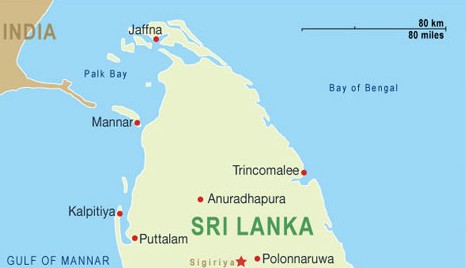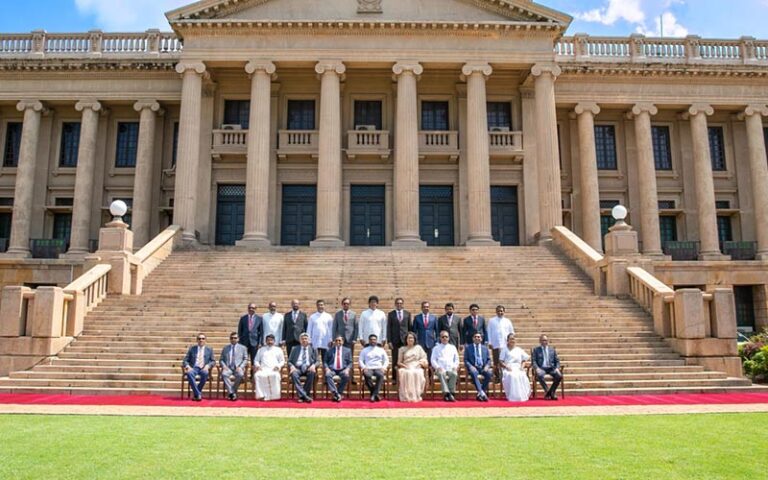 Presidential Special Envoy for Human Rights Minister Mahinda Samarasinghe while saying that the country does not believe “That everything is fine” urged for the international community to give the country “time and space” to ensure overcome the ensuing challenges.
Presidential Special Envoy for Human Rights Minister Mahinda Samarasinghe while saying that the country does not believe “That everything is fine” urged for the international community to give the country “time and space” to ensure overcome the ensuing challenges.
Answering a question during the sessions at the Universal Periodic Review at the 22nd Session of the United Nations Human Rights Council, Geneva today Sri Lanka also asked the International Community as to why “it keeps silent on the atrocities committed by the LTTE.”
Following is the full statement at the Adoption of the Report of the UPR Working Group by Minister Mahinda Samarasinghe at the 22nd Session of the United Nations Human Rights Council.
“Mr. President,
“My delegation and I join you this morning with a deep sense of satisfaction. November 2012 saw Sri Lanka face its second UPR and we were able to lay before the working group, our progress since 2008 and the expectations for future improvements in the promotion and protection of human rights, going forward. We have come a long way since the initial Universal Periodic Review of Sri Lanka during the first cycle in 2008. My country then was engaged in a conflict against terrorism – commencing in 2006 – trying to rescue a civilian population held by a ruthless group of terrorists. A year after that first review, we finally achieved success in the humanitarian operation and witnessed the dawn of a new era of peace, stability and prosperity for all Sri Lankans. Since May 2009 we engaged in a period of consolidation, removing military involvement in civil administration, reconstruction, demining, rehabilitation, resettlement and launched our initial efforts at national reconciliation and peace-building.
“Mr. President, the UPR has been an event in which we have been able to periodically pause, take stock, reflect and share with our friends in the Human Rights Council our achievements, challenges and determination to move forward. The interest and level of participation in the UPR of Sri Lanka is also sincerely appreciated. We noted that a clear majority of the countries that engaged in the UPR last November acknowledged our progress. Some of the countries that did so also pointed out the challenges that we faced. We were able to take up some of the constructive recommendations made and we also made voluntary commitments.
“To sum up, Mr President, Sri Lanka received a total of 204 recommendations during the second cycle of its UPR held last November. At the adoption of the report in the Working Group, Sri Lanka accepted 110 recommendations and following further examination, Sri Lanka decided to support a further 3 recommendations, bringing the total number of recommendations enjoying our support to 113.
“Another 91 recommendations do not enjoy the support of Sri Lanka. Our position on the recommendations we were unable to support are clearly set out in the Addendum to the Report of the Working Group A/HRC/22/16/Add.1. The Addendum further clarifies and elaborates Sri Lanka’s stance on some of the recommendations emanating from the Review. These recommendations have been duly noted and Sri Lanka will endeavour to address these issues through relevant national policies and programmes. In addition, Sri Lanka has also made 19 voluntary commitments.
“In this context, I must point out that Sri Lanka has accepted the 12 recommendations specifically referring to the National Action Plan for the implementation of the recommendations of the Lessons Learnt and Reconciliation Commission (LLRC), which is our mechanism to implement the recommendations of the LLRC. It is perhaps unfortunate that we were unable to agree to more refinements and modifications in the text of some recommendations in order to achieve a consensus that could have led to the acceptance of more recommendations. It is our belief that the level of flexibility that characterized our experience in 2008, is preferable to the rigid textual formality that appears to govern the UPR at present. The UPR is an inter-governmental process that is based on cooperation and constructive engagement.
“I would also briefly allude to some of the positive developments since November. Much of the salutary achievements are also referred to in our national statement to the High Level Segment of the 22nd Session at the end of February.
“As I stated on that occasion, the Government of Sri Lanka has also made requisite financial provision by budgetary allocation for 2013 for the implementation of the National Action Plan on the Implementation of the recommendation of the LLRC. Over Rs. 1.2 billion, has been committed to funding the various activities. Our progress in the process of implementation is openly shared with anyone interested by way of publication on the web. This is the level of commitment we have shown.
“We have consolidated our gains in resettlement. Our achievement is, perhaps, unparalleled given the short period in which progress was accomplished.
“In the overall process of accountability which was the subject of some interventions during the working group session, the first issue that must be addressed is that of the arbitrary figures of so-called civilian victims. These figures have been repeated by several sources without once verifying the facts.
This is why our national census of 2012 and the enumeration in the North preceding it in 2011 were of such importance. Ground verification of facts is continuing into the results of these processes. We believe we will be able to gain an accurate picture of the several causes of civilian deaths.
“A Cabinet Memorandum titled “Assistance and Protection of Victims of Crime and Witnesses Bill” was submitted by the Ministry of Justice and was taken up for policy approval at the Meeting of the Cabinet of Ministers held on 07 February 2013. It was decided to obtain the views of the Attorney General on this matter to aid in the deliberations of the Cabinet.
“Subsequent to the recommendations of the LLRC, the Attorney-General reviewed the cases relating to the five (5) students from Trincomalee and of the Action Contre La Faime (ACF) workers. Having concluded the work on the five sudents from Trincomalee, the Attorney-General has directed the Police to commence Non-Summary Judicial proceedings. The review with regard to the ACF case is also ongoing.
“Also on the question of accountability, inquiries are in train by the military authorities as to questions of civilian casualties during the humanitarian operation including the Channel 4 video footage irrespective of its authenticity.
“Further to the recommendation of the LLRC, the database on detainees is available to next of kin (NoK) who are able to obtain details in response to their inquiries. The investigations into those allegedly disappeared are ongoing through national mechanisms.
“As we have regularly informed this Council, the National Plan of Action for the Promotion and Protection of Human Rights (NHRAP), was a commitment that grew out of our initial Review in 2008. That was a principal pledge we made and one that we spent considerable time and effort in realizing. December 2012 marked the first year of implementation of the NHRAP. We are currently engaged in an evaluation of the first year and will shortly publish our progress. The NHRAP was conceived of as an overarching measure to consolidate our gains and to systematically address the various issues and challenges in the field of human rights.
“We will now have to conceive of a national mechanism that will take into consideration the recommendations supported and pledges made consequent to the adoption of the Report before the Council on this occasion. We are confident that we can incorporate the outcome document into our national plans and programmes of action, so that, by 2017 when we next face a Review, that we will be able to demonstrate further advances in the promotion and protection of human rights for the benefit of the Sri Lankan people.
I reiterate what I said earlier that Sri Lanka is deeply appreciative of Member and Observer States for their interest and positive engagement during its UPR Process as well as their acknowledgement of our efforts in the promotion and protection of human rights. As with the UPR, Sri Lanka will continue its transparent, proactive and constructive engagement with the Human Rights Council and keep Member and Observer States informed of further developments in Sri Lanka in the field of promotion and protection of human rights.
I look forward to the engagement during the ensuing hour and expect a positive outcome that will accrue to the benefit of the multi-ethnic, multi-lingual, multi-religious and multicultural people of Sri Lanka.
Source: Daily Mirror (Sri Lanka)




